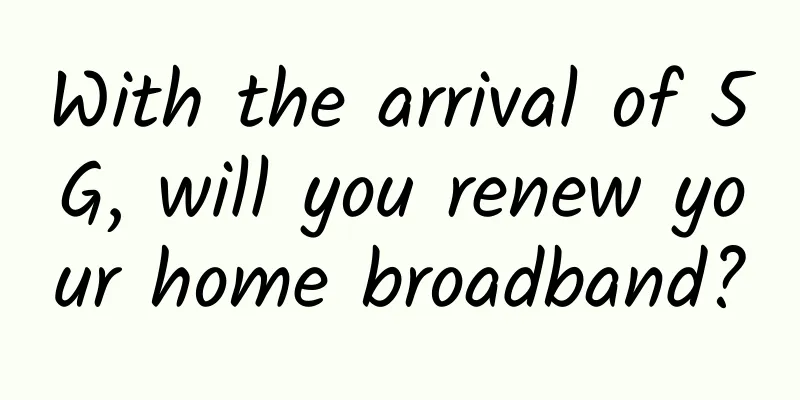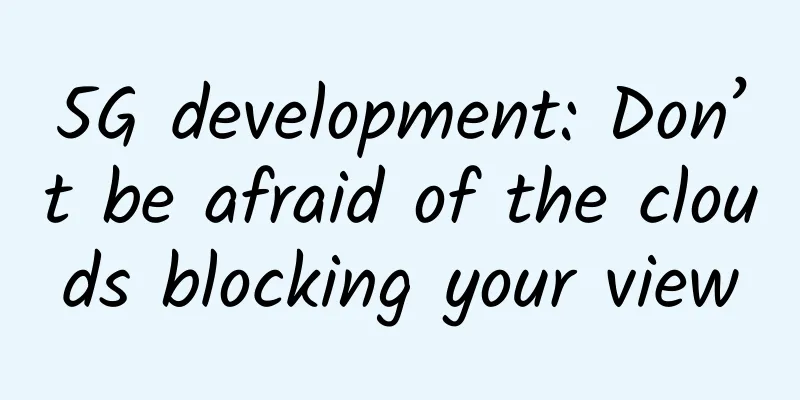With the arrival of 5G, will you renew your home broadband?

|
Since the three major operators issued 5G commercial licenses, various topics about 5G networks have been hotly discussed. Some people have tried the 5G network speed before, and the peak data is amazing. A while ago, it was revealed that the charges for 5G traffic packages are lower than 4G charges. Various signs indicate that the arrival of 5G networks may replace existing 4G networks and broadband networks, including WiFi. So will 5G replace broadband? With the arrival of 5G, do broadband still need to be renewed?
With the arrival of 5G, do we still need to renew our broadband subscription? In fact, broadband has entered the civilian market very early. Now we have popularized 100M optical fiber, and its most significant advantages are stable transmission and fast speed. The theoretical rate of 5G reaches 10G, which is dozens of times that of ordinary household broadband. Will we still use ordinary fiber-to-the-home broadband after 5G becomes popular? Can WiFi keep up with the speed? Judging from the current capabilities, wired communication is more capable The two main factors that influence people's choice of WiFi or mobile network are speed and price. In fact, users should have experienced this in the past two years. In the past, the mobile network traffic charges were high, and sometimes people would not even turn on the traffic switch. As long as there was WiFi, the first thing they would do was to ask for the WiFi password. This situation still exists now. Now, let’s not talk about 5G, as for 4G, the data package charges have dropped a lot compared with previous years. Some packages allow you to use as much data as you want, with 10GB or 20GB of data, which you can’t use up in a month, and you don’t feel bad about watching videos. Unless you are in an extreme area without mobile network coverage, the reliance on WiFi is getting lower and lower. That is, you will only connect to the high-speed WiFi network at home when you are at home. Mobile networks are faster and cheaper, so people naturally prefer them. However, mobile networks cannot match the current 200M broadband speed at home, and there is no data limit, so it is more convenient to use WiFi at home. This phenomenon has almost become a default. There is WiFi at work and WiFi at home, and the main reason for using mobile networks is when you are outside. The mobile network speed in many places is very slow now, and the reason for this is that there are too many users sharing the base station signal in the same area. It is not uncommon for home broadband speeds of 100 Mbps or 200 Mbps to be converted into actual download speeds, which is also incomparable to mobile networks. Someone may ask, if 5G comes, will it eliminate the existing broadband and WiFi? The answer is no. Broadband was designed to be one-time and long-term from the beginning. The line will not be moved until it ages or for other reasons. The long-term use of fixed networks was taken into consideration from the beginning of the design. Adding one more user to the network in a community will only cost the operator very little extra, but the layout of mobile networks is different. The deployment and maintenance costs of mobile networks are much higher than those of fixed networks. In addition, the bandwidth of the last hop of the air interface is much smaller than that of the fiber optic cable entering the home. When there are many users, the base station will be greatly affected. Therefore, the charging model of mobile networks is usually based on traffic. Different cost models lead to different charging methods, which in turn lead to different user habits, which means that mobile networks and fixed wired networks will develop in parallel. Whether it is 3G/4G or the 5G that is being studied, the relationship between mobile networks and WIFI will always be one of integration and complementarity. |
<<: I'm a tough guy, so please take this detailed description of IPSec architecture.
>>: Will 5G applications enable hardware storage updates or the expansion of cloud services?
Recommend
The data center is dying? Not really
Today, despite the greater adoption and growth of...
H3C: Using Converged Network Technology to Support Digital Transformation of All-Scenario Services in Smart Hospitals
Hospitals are the core of protecting the health a...
Outlook for Nine Technology Trends in the Digital Economy from 2021 to 2025
[[361322]] The digital economy is divided into th...
Operators are satisfied with 4G, what can they do after 5G is commercialized?
In the early stage of 4G development, the dividen...
80VPS Los Angeles MC Data Center 199 yuan/year KVM simple test
A few days ago, I shared the information about th...
Is the future of the new WIFI standard 802.11ad reliable?
Now there is a new WIFI standard that can increas...
5G is coming. China Mobile will incubate various vertical applications to realize the Internet of Everything
4G changes life, 5G changes society. At the 2016 ...
The U.S. military attaches great importance to it! 5G private network is about to be implemented at the U.S. Navy base
Recently, Hughes Network Systems (Hughes) announc...
Learn about FTP/FTPS/SFTP file transfer protocols in one article
Introduction to FTP FTP (File Transfer Protocol) ...
Sharktech: High-security servers 1Gbps unlimited traffic from $79/month, 10Gbps unlimited traffic from $399/month, Los Angeles/Denver/Chicago/Netherlands data centers
Sharktech is a well-established foreign merchant ...
V.PS: €4.17/month KVM-1GB/20GB/1TB/Hong Kong Data Center
V.PS is a site under xTOM, providing VPS hosts ba...
Friendhosting Halloween 30% off, 13 data center VPS monthly payment from 2.1 euros
Friendhosting has launched this year's Hallow...
SpringCloud Alibaba Microservices Practice: Gateway Authorization VS Microservices Authorization
[[386274]] This article is reprinted from the WeC...
Why is 5G important for the Internet of Things?
The fifth generation of network bandwidth arrives...









